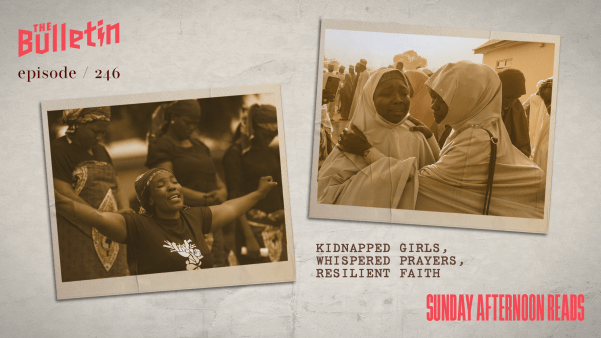This year marks the 1,700th anniversary of the Nicene Creed, an early statement of Christian beliefs—including articulation of the doctrine of the Trinity—that many followers of Jesus continue to incorporate into worship today. Despite Protestants’ historically complicated relationship with the text, some evangelicals, as Daniel Silliman noted in our May/June article “How the Nicene Creed Became Cool Again,” have been reciting it more frequently as part of their worship.
“I frequently use both the Apostles’ Creed and the Nicene Creed to explain the heart and core definition of Christianity,” wrote Christine Taylor on Facebook. “Goes right to the heart of what I mean when I say I’m orthodox,” @grantbarber6 wrote on Instagram. “The belief in the Trinity, Incarnation and Resurrection, the Holy Spirit, and present day Christians bearing Jesus individually, but more important, corporately. Orthodox does not mean a coded way of judging others’ views on moral topics. It is not bigoted virtue signaling.”
Another Instagram commenter shared a story of the creed’s power in her own life. “A few years ago, my husband and I were led into a spiritual situation with a young man we both cared deeply for who had delved deeply into the occult,” she wrote. “The Holy Spirit actually led us to proclaim the creed out loud night after night. It strengthened our faith, reminding us of who we rely on and who has the authority. I saw the demon leave and God receive the glory. Argue if you will. The creed is cool! The creed is biblical. For everything it says, we can say, ‘It is written.’”
Kate Lucky, senior editor, culture and engagement
The Nicene Creed is the result of intense debates among competing theologies throughout the fourth century. Consensus was achieved on two principles: The most credible theological inferences from the Bible are ones that (1) have the broadest and clearest Scriptural support and (2) are logically consistent with other clear doctrines of the Bible. But to understand the creed, one really needs to know what the framers meant by consubstantial, true God, begotten, and world to come. And these are best understood when contrasted with the heretical claims they were intended to refute—claims that have resurfaced in our time.
Richard Brown, Durham, NC
Should I Talk to My Kids’ School About the Pledge of Allegiance?
Your advice column recently answered a question to a parent about their child choosing not to participate in the Pledge of Allegiance. I disagree with the advice that the parent should talk to the school proactively. Why would they do that? It sounds as if the child is able to respectfully opt out and no one is taking issue with it. That’s the best result. Why force an issue when there isn’t one? We don’t have to pick fights all the time. To tell someone they should bring it up when there isn’t a problem suggests it is about something other than the kid.
Rick Miltimore, Brentwood, TN
A Splintered Generation
While I agree with the three tentative explanations [for the dechurching gender gap], one was not mentioned: Most evangelical churches offer different things to men and women. Growing up in the church, most boys and girls experience similar opportunities to learn from God’s Word, serve him at home and in missions, and grow in their faith. As they enter adulthood and consider where God is calling them in terms of their professional and family life, young women find that many of the vocational paths open to men in evangelical spaces are closed to them. Young women are asked to believe that Jesus has redeemed them completely, fully accepted them into his family, called them to kingdom work, and does not consider them appropriate candidates for many professional ministry positions. Is it any surprise some of them find this
difficult to believe?
Rhiannon Evangelista, Atlanta, GA
What Do We Want from Dietrich Bonhoeffer?
As a Lutheran theology student, I traveled to Germany in 1979. My intent was to learn the language and study the writings of Martin Luther. I eventually married a German woman and was brought into a German family. Often, people would speak about what happened to them during the rise of Hitler and the Nazis. I heard some remarkable stories of survival. I did not always agree with these individuals, but they had lived through this dark period in German history; I had not. I have learned that I should not so quickly and easily condemn or praise as we are prone to do in our culture.
Richard Krause, Pewaukee, WI
The Christian Schools That Cried Wolf
“Fearmongering is not a godly way to keep those tuition checks rolling in. I have seen the results of this style of advertisement, and some of you deserve a refund.”
Tonya Carroll Syers Matheson (Facebook)
Inside the Crowded Hospital Full of Congo’s Rape Victims
Thank you for printing this. It was very disturbing to read about the horrible crimes being committed against women and children. We need to be aware of the degrading atrocities happening in our world and of people like Dr. Mukwege, who are pouring out their energy to make a tremendous difference. May we pray that this situation, which seems to stem from greed, somehow be rectified. It is not too difficult for our loving and mighty God to bring this about.
Esther Aikens, Calgary, Alberta
Measuring the Good Life
The opening paragraph nailed it: Short-term missions folks usually come back in awe of the joyful community they experienced in the developing country they served. Developing countries might have many issues, but loneliness and [lack of] meaning are not among them. Meanwhile, our youth are riddled with anxiety and dependent on little black boxes in their pockets for connection. How can the church be the voice in the wilderness to lead the way?
Christian Anderson, Stuart, FL















